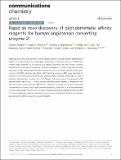| dc.contributor.author | Zhang, Genwei | |
| dc.contributor.author | Brown, Joseph S | |
| dc.contributor.author | Quartararo, Anthony J | |
| dc.contributor.author | Li, Chengxi | |
| dc.contributor.author | Tan, Xuyu | |
| dc.contributor.author | Hanna, Stephanie | |
| dc.contributor.author | Antilla, Sarah | |
| dc.contributor.author | Cowfer, Amanda E | |
| dc.contributor.author | Loas, Andrei | |
| dc.contributor.author | Pentelute, Bradley L | |
| dc.date.accessioned | 2022-03-15T18:43:04Z | |
| dc.date.available | 2022-03-15T18:43:04Z | |
| dc.date.issued | 2022-12 | |
| dc.identifier.uri | https://hdl.handle.net/1721.1/141198 | |
| dc.description.abstract | <jats:title>Abstract</jats:title><jats:p>Rapid discovery and development of serum-stable, selective, and high affinity peptide-based binders to protein targets are challenging. Angiotensin converting enzyme 2 (ACE2) has recently been identified as a cardiovascular disease biomarker and the primary receptor utilized by the severe acute respiratory syndrome coronavirus 2. In this study, we report the discovery of high affinity peptidomimetic binders to ACE2 via affinity selection-mass spectrometry (AS-MS). Multiple high affinity ACE2-binding peptides (ABP) were identified by selection from canonical and noncanonical peptidomimetic libraries containing 200 million members (dissociation constant, <jats:italic>K</jats:italic><jats:sub>D</jats:sub> = 19–123 nM). The most potent noncanonical ACE2 peptide binder, ABP N1 (<jats:italic>K</jats:italic><jats:sub>D</jats:sub> = 19 nM), showed enhanced serum stability in comparison with the most potent canonical binder, ABP C7 (<jats:italic>K</jats:italic><jats:sub>D</jats:sub> = 26 nM). Picomolar to low nanomolar ACE2 concentrations in human serum were detected selectively using ABP N1 in an enzyme-linked immunosorbent assay. The discovery of serum-stable noncanonical peptidomimetics like ABP N1 from a single-pass selection demonstrates the utility of advanced AS-MS for accelerated development of affinity reagents to protein targets.</jats:p> | en_US |
| dc.language.iso | en | |
| dc.publisher | Springer Science and Business Media LLC | en_US |
| dc.relation.isversionof | 10.1038/s42004-022-00625-3 | en_US |
| dc.rights | Creative Commons Attribution 4.0 International license | en_US |
| dc.rights.uri | https://creativecommons.org/licenses/by/4.0/ | en_US |
| dc.source | Nature | en_US |
| dc.title | Rapid de novo discovery of peptidomimetic affinity reagents for human angiotensin converting enzyme 2 | en_US |
| dc.type | Article | en_US |
| dc.identifier.citation | Zhang, Genwei, Brown, Joseph S, Quartararo, Anthony J, Li, Chengxi, Tan, Xuyu et al. 2022. "Rapid de novo discovery of peptidomimetic affinity reagents for human angiotensin converting enzyme 2." Communications Chemistry, 5 (1). | |
| dc.contributor.department | Massachusetts Institute of Technology. Department of Chemistry | |
| dc.contributor.department | Koch Institute for Integrative Cancer Research at MIT | |
| dc.contributor.department | Massachusetts Institute of Technology. Center for Environmental Health Sciences | |
| dc.relation.journal | Communications Chemistry | en_US |
| dc.eprint.version | Final published version | en_US |
| dc.type.uri | http://purl.org/eprint/type/JournalArticle | en_US |
| eprint.status | http://purl.org/eprint/status/PeerReviewed | en_US |
| dc.date.updated | 2022-03-15T18:36:03Z | |
| dspace.orderedauthors | Zhang, G; Brown, JS; Quartararo, AJ; Li, C; Tan, X; Hanna, S; Antilla, S; Cowfer, AE; Loas, A; Pentelute, BL | en_US |
| dspace.date.submission | 2022-03-15T18:36:05Z | |
| mit.journal.volume | 5 | en_US |
| mit.journal.issue | 1 | en_US |
| mit.license | PUBLISHER_CC | |
| mit.metadata.status | Authority Work and Publication Information Needed | en_US |
